Research Article
A Quasi Experimental Study to Assess the Effectiveness of Prescriptive Bibliotherapy on Anxiety among Pre-Operative and Post-Operative Patients Undergoing Cholecystectomy in Dhruv Hospital Amritsar Punjab
5860
Views & Citations4860
Likes & Shares
The aim of the study was to assess the effectiveness of prescriptive bibliotherapy on anxiety among pre-operative and post-operative patients undergoing cholecystectomy. The sample comprised of 40 patients divided into two groups; experimental group 20 & control group 20. Speilbergers state anxiety inventory was used to collect data. ‘t’ value & Anova was calculated for the comparison of pretest and posttest. State anxiety score of experimental and control group of patients. Results showed that there was marked difference in pretest and posttest state anxiety scores of patients in experimental group where as in control group there was a statistically significant difference between pretest and post test scores. However no significant effect was found in control group. However no significant effect was found according to age, educational qualification, religion, technique of surgery & income support system on pretest anxiety scores of patients in both experimental and control group.
Keywords: Prescriptive bibliotherapy, Pre-operative, Post-operative, Cholecystectomy, Digestion, Removal of gallbladder
INTRODUCTION
Pre-operative anxiety is a usual response experienced by patients who are admitted to a hospital for surgery. Pre-operative anxiety is an unpleasant feeling of apprehension or uneasiness that arise from an individual’s limited knowledge, lack of clarity and fears regarding operation. Especially the patients admitted for abdominal surgery have intense anxiety related to surgical procedure, recovery from anesthesia and digestion after removal of gallbladder.
Pre-operative state anxiety, which is characterized by the fear of unknown, feeling of being in a strange situation, and the feeling of loss of control. When patients are asked the causes of their anxiety they verbalize different components of preoperative anxiety. Remaining separated from their family, and most importantly from their children, waiting for an operation causes them anxiety. Fear being awake during the operation is a common reason for anxiety. According to Jawaid [1] other most common reasons for anxiety are postoperative pain, waiting a very long time for the operation, nausea and vomiting, inability to wake from anesthesia, and fear of injection. Moreover, other studies demonstrate that patients develop anxiety because of the environment they are in. due to the surrounding hospital environment patients feel uncomfortable as they have difficulty in reaching for personal belongings, experience a sense of sleeping in a foreign bed and suddenly interrupted lifestyle.
Bibliotherapy refers to the use of literature to help people cope their psychological problems arising due to complex situations in their lives. It provides need-based literature appropriate and identifying to an individual personal situations and developmental needs at suitable times. Bibliotherapy enables the individuals of all ages to introspect and comprehend themselves to handle their problems in a better way.
The paradigm of bibliotherapy is that people relate themselves with literary characters similar to themselves [2]. Bibliotherapy aims to be more ‘reactive or responsive’. It is goal oriented and focused on letting individuals to respond positively or negatively to the reading material. The reader becomes a part of the storyline, having a conflict to comprehend the situation at the deepest levels. The respondent makes a positive change in his emotional reaction towards surgery. Participants engage in activities that help them reflect on what they read, such as group discussion and dialogue journal.
OBJECTIVES
- To assess and compare the pretest anxiety among experimental group and control group of patients, undergoing cholecystectomy
- To compare pretest and posttest anxiety among experimental and control group of patients
- To assess and compare posttest anxiety among experimental and control group
- To find out the relationship of pretest anxiety score among patients who are undergoing cholecystectomy with selected variables such as age, sex income etc.
HYPOTHESIS
- H1-there is a reduction in pre-operative posttest score of patients receiving bibliotherapy in the experimental group.
SAMPLE & SAMPLING TECHNIQUE
The investigator selected a sample of 40 patients posted for cholecystectomy, 20 for experimental group and 20 for control group from Dhruv Hospital, Amritsar, Punjab. The purposive sampling technique was used. The tool used in the study has 2 parts:
Part 1: Sample characteristics
This part consists of items for obtaining personal information i.e., age, gender, education, religion, income, technique of surgery and support system.
Part 2: Standardized tool STAI (state anxiety scale)
This part consists of 20 items. Helps distinguish between two types of anxiety i.e., state anxiety & trait anxiety. The first subscale measures state anxiety, the second measures trait anxiety. The range of scores is 20-80, the higher the score indicating greater anxiety. Some of the questions relate to the absence of anxiety, and are reverse scored (1, 6, 7, 10, 13, 16 & 19). Approximately 10 min are required to complete STAI.
Criterion measure
Maximum score= 80
Minimum score= 20
Levels of anxiety
20-40= mild anxiety
41-60= moderate anxiety
61-80= severe anxiety
The conceptual frame work is based on Aguilera & Massick’s Effects of Balancing Factors in Stressful Events (1982).
All the balancing factors are missing in the patients of control group, no prescriptive bibliotherapy is done as crisis intervention to the patients of control group. Thus, the control group patients may continue to experience the same level of anxiety or increased level of anxiety resulting in a narrow perceptual field. A state of disequilibrium may continue as their existing coping mechanism will not suit the situation and fail to deliver any positive results. As a consequence, these patients may not adjust well in the pre-operative and post-operative period.
DATA COLLECTION PROCEDURE
The data collection for the study was carried out throughout the month of December. Before starting the task of data collection, formal permission was obtained from the head of Board of directors of Dhruv Hospital, Amritsar and H.O.D general surgery department Dhruv Hospital, Amritsar. The data collection was done in the inpatient departments i.e., male surgical ward general and private wards. Data was collected from pre-operative and post-operative patients undergoing cholecystectomy Dhruv Hospital, Amritsar. Prior to the interview and applying State Trait Anxiety Inventory, rapport was established with respondents by self-introduction. The purpose of the study was explained to get needed information. They were assured that their responses would be kept confidential and would be used for research purpose. In the private ward pretest of control group was taken and after two days posttest was taken. In the general ward pretest of experimental group was taken in general surgery ward. After one day prescriptive bibliotherapy was given using prescriptive literature and pamphlets regarding cholecystectomy surgical procedure, duration of surgery, effect of anesthesia, waking up after anesthesia pain management, time taken for recovery, hospital stay and self-care after surgery, dietary modification, lifestyle changes, resuming daily activities etc. Pamphlets included short story of characters undergoing cholecystectomy and how they clear their doubts regarding surgery, anesthesia, recovery and digestion after removal of gall bladder. Next day preoperative posttest was taken. The analysis of pilot study was done in accordance with the objectives and the feasibility of the study. The time taken by each respondent was 10 min. It took 1 month to complete the entire procedure. The data collected was then arranged and compiled for analysis.
RESULTS
Section I
Demographic characteristics of sample (Table 1).
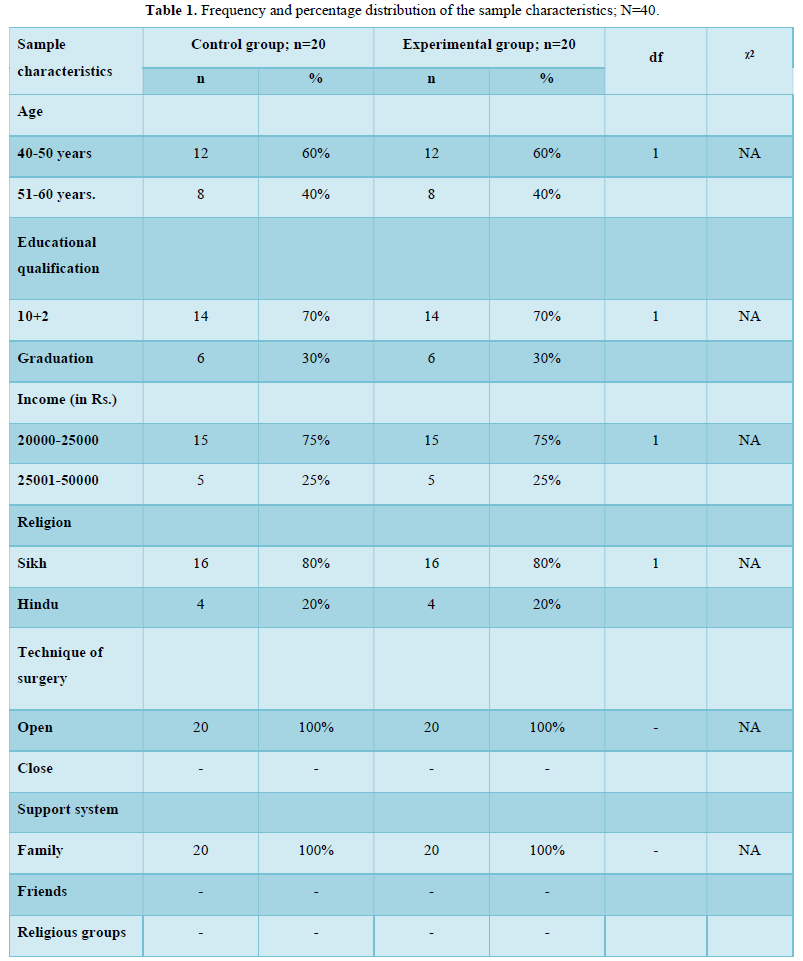

Section II
Objective 1: To assess and compare the pre-test anxiety among experimental group and control group of patients, undergoing cholecystectomy (Tables 2-10).



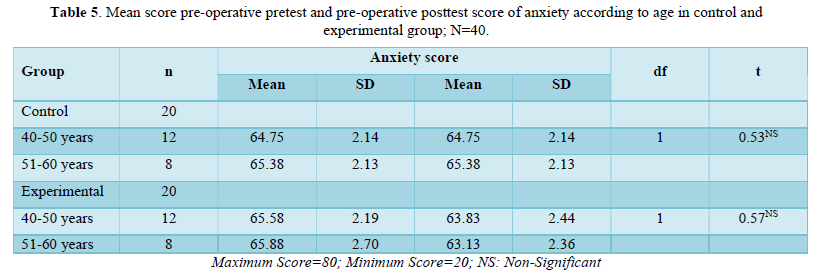

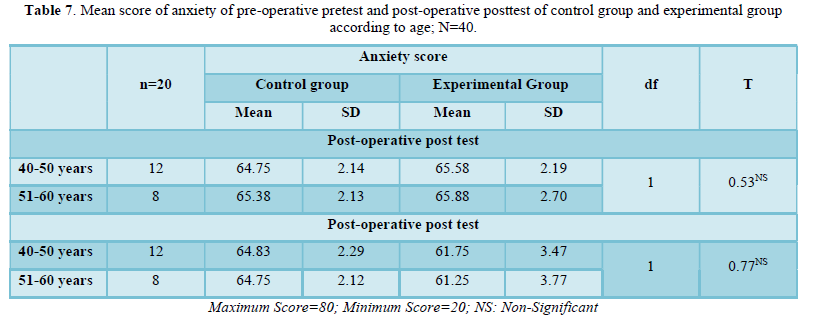
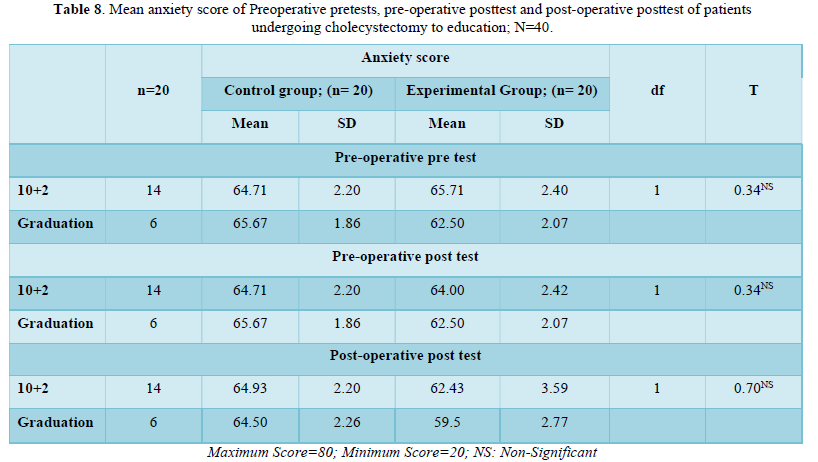
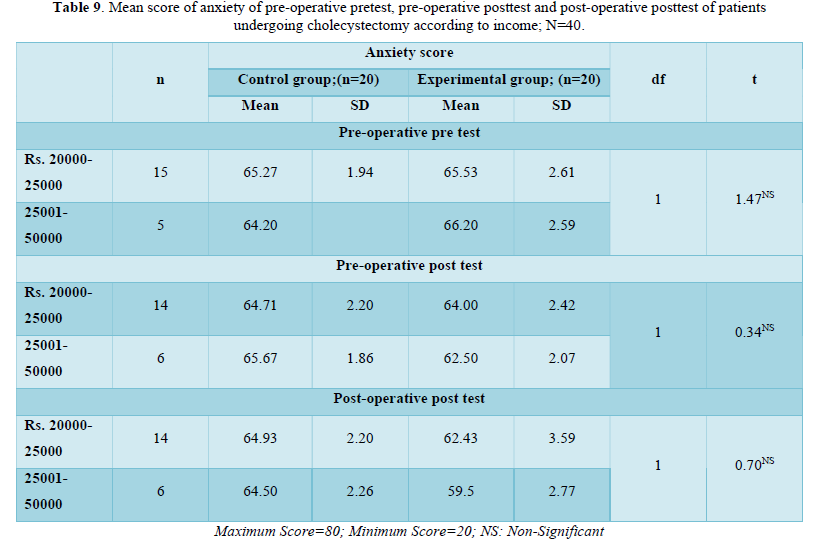
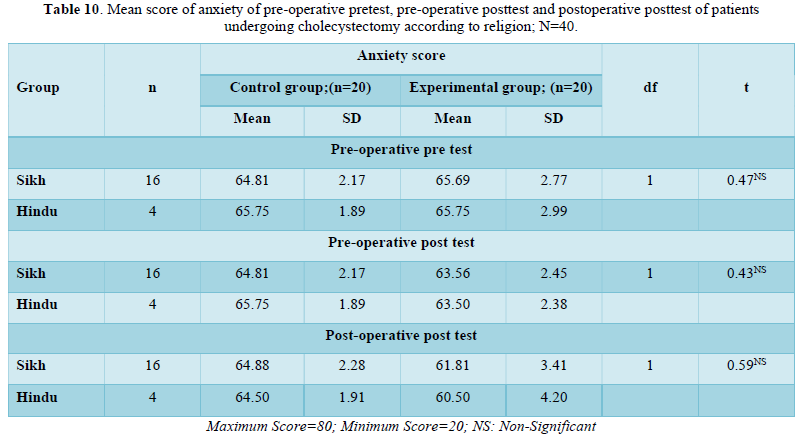









MAJOR FINDINGS OF THE STUDY
According to income, in both control and experimental group majority of patients undergoing cholecystectomy were in the income group of 20000-35000 (85%, 85%) and least were in the income group of 36000-50000 (15%, 15%) respectively.
As per educational qualification in both control and experimental group majority of patients undergoing cholecystectomy were in the group of 10+2 (70%, 70%) followed by the group of (30%, 30%) respectively.
According to religion in both control and experimental group majority of patients undergoing cholecystectomy were in the religion group of Sikh (80%, 80%) followed by the religion group of Hindu (20%, 20%) respectively.
The pre-operative pretest anxiety of experimental group is significantly more as compared to control group.
There is a marked difference in pretest and posttest state anxiety scores of experimental and control groups.
IMPLICATIONS OF THE STUDY
The findings of the study have several implications, which are discussed in four areas:
- Nursing practice
- Nursing research
- Nursing administration
Nursing Practice
Different nursing roles have developed that do embrace various nursing issues that developed largely as a result of the introduction of new surgical procedures. There is a need for the nurses to embrace nursing assessment that is comprehensive and effective in reducing pre-operative anxiety of patients undergoing surgery. Pre-operative counseling should be adopted as an intervention and included in the care plan of patients posted for surgery. Nurses should learn to identify verbal expression and forms of language used by patients, in addition to nonverbal messages, because then they can empower patients by opening new and important perspectives for them. Nurses’ every question, remark or piece of advice leads to individualized understanding and interpretation by the patient. It is important to remember that counseling is a unique, dynamic and transforming process. Nurses should observe what figures of speech they use and thus gain self-awareness and discover new tools to work through a training program to counsel patients and develop professional empowering skills.
Nursing Research
Some attention has been paid in developing countries to evaluate the effectiveness of counseling on anxiety among pre-operative patients, but very few studies have been conducted in India. Nurses need to assist clients to expand their outlook by revisioning their lives encouragement of the patient’s participation so that Patients preparing to undergo surgery should not suffer needless anxiety. The information contained in the present study can be valuable source of data for the future researchers. It can help them in conducting future researches with large sample size in different setting. Emphasis should be laid on the publication of findings of research in the journals to disseminate the research-based evidence for nurse practitioners so that it can help the nurse practitioners in giving better care to the patients. It can also be presented at various nursing forums so that more number of nurses can become aware about the importance of providing counseling to patients undergoing abdominal surgery.
Nursing Administration
There is a need to sensitize nursing administrators about the importance of counseling for patients undergoing abdominal surgery. In-service programs can also be organized for nurses to teach them about methods and effectiveness of pre-operative counseling. Even workshops can be organized to enhance the counseling skills of the nurses so that they can provide effective counseling to patients posted for surgery and alleviate pre-operative anxiety.
DISCUSSION
This chapter deals with the discussion of the findings of the study in accordance with the objectives of the research problem. The findings of the study are discussed with reference to the results observed by the investigator. The analysis of data according to objective first i.e., to asses and compare the pretest anxiety among experimental group and control group of patients undergoing cholecystectomy concluded that pre-operative pretest anxiety was higher in the control group. Mean value of pre-operative pretest anxiety among experimental group& control group are 65.65 & 65.00 respectively and t is 2.942 which is significant at 0.05 level of significance p
Surgery Analyzing was performed through independent t-test and χ2 test. P
Patients were interviewed in the postoperative period and anxiety was measured. The data-collecting tool consisted of the Individual Information Form and the State-Trait Anxiety Inventory. The collected data were analyzed by using the SPSS Program to find the frequency, the percentage, the mean and the standard variables, and the hypothesis was tested with Chi-square, variance, and t-independent test. It was found that the incidence rates from the post-operative anxiety score of the study group were lower than those of the control group (p < .05). The results of this research demonstrated that gynaeoncologic surgery patients who were given systematic.
- Jawaid M, Mushtag A, Mukhtar S, Khan Z (2007) Preoperative anxiety before elective surgery. Neurosciences 12(2): 145-148.
- Hebert TP, Kent R (2000) Nurturing social and emotional development in gifted teenagers through young adult literature. Roeper Rev 22(3): 167-171.
- Caumo W, Schmidt AP, Schneider CN, Bergmann J, Iwamoto CW, et al. (2001) Risk factors for preoperative anxiety in adults. Acta Anaesthesiol Scand 45(3): 298-307.
- Beck AT, Epstein N, Brown G, Steer RA (1988) An inventory for measuring clinical anxiety: psychometric properties. J Consult Clin Psychol 56(6): 893-897.
- Muglatti M, Komarik N (2008) Factors related to patients’ anxiety before and after oral surgery. J Oral Maxillofac Surg 66(5): 870-877.
- Aono J, Mamiya K, Manabe M (1999) Preoperative anxiety is associated with a high incidence of problematic behavior on emergence after halothane anesthesia in boys. Acta Anaesthesiol Scand 43(5): 542-544.
- Hobson JA, Slade P, Wrench IJ, Power L (2006) Preoperative anxiety and postoperative satisfaction in women undergoing elective caesarean section. Int J Obstet Anesth 15(1): 18-23.
- Anderson CM, MacCurdy MM (2000) Writing and healing: Toward an informed practice. Urbana, IL: National Council of Teachers of English.
- Gladding ST, Gladding C (1991) The ABCs of bibliotherapy for school counselors. School Counselor 39(1): 7-13.
- Lenkowsky RS (1987) Bibliotherapy: A review and analysis of the literature. J Spec Educ 2(2): 123-32.
- Morawski CM, Gilbert JN (2000) Developmental interactive bibliotherapy. Coll Teach 48(3): 108-114.
QUICK LINKS
- SUBMIT MANUSCRIPT
- RECOMMEND THE JOURNAL
-
SUBSCRIBE FOR ALERTS
RELATED JOURNALS
- Journal of Psychiatry and Psychology Research (ISSN:2640-6136)
- Archive of Obstetrics Gynecology and Reproductive Medicine (ISSN:2640-2297)
- Journal of Cancer Science and Treatment (ISSN:2641-7472)
- Journal of Rheumatology Research (ISSN:2641-6999)
- Journal of Nursing and Occupational Health (ISSN: 2640-0845)
- Journal of Pathology and Toxicology Research
- Journal of Oral Health and Dentistry (ISSN: 2638-499X)


